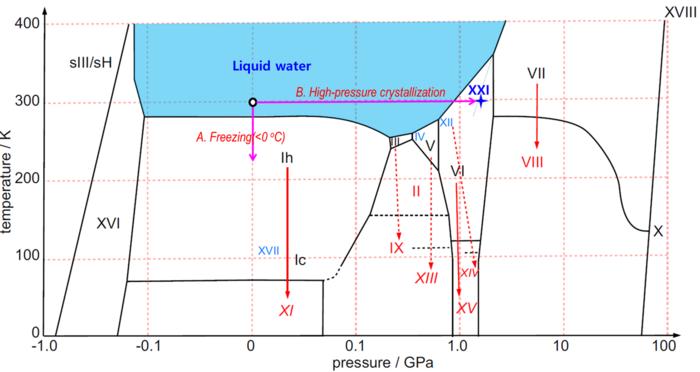Meet Ice XXI, a newly identified form of ice that can exist at room temperature (albeit very briefly). Creating it is no small feat, as it requires crushing loads of pressure, far more intense than the pressure found at the bottom of the deepest ocean trench.
If you’re an Earth-bound human, you’re undoubtedly most familiar with the solid ice that forms when liquid water cools below 0 °C ( 32°F) at standard atmospheric pressure. The low temperature reduces energy within the water, allowing it to form a rigid, crystalline structure that turns into a solid state.
However, water can also crystallize at room temperature or even above the boiling point because it’s possible to tinker with its atomic structure using pressure, as well as temperature, to create different patterns within the crystal lattice.
By playing around with different temperatures and pressures, it’s possible to rearrange how the water molecules stack together and observe a variety of ice phases during the crystallization process. Over the past century, scientists have identified at least 20 unique solid structures, or “phases,” of ice.

Diagram showing some of the known phases of ice, showing the newly discovered room-temperature high-pressure phase, Ice XXI and liquid water.
Image credit: Korea Research Institute of Standards and Science (KRISS)
Now, researchers at the Korea Research Institute of Standards and Science (KRISS), plus scientists from Germany, Japan, the US, and the UK, have added a 21st ice phase to the list, named Ice XXI.
They created it by supercompressing water using a cutting-edge device called a dynamic diamond anvil cell (dDAC*). Unlike traditional diamond anvil cells, which gradually squeeze samples and can cause unwanted crystallization, the dDAC compresses water almost instantly – just 10 milliseconds – while minimizing mechanical shock. This rapid, precise compression pushed water into the pressure range of another ice phase, Ice VI, yet forced it into a never-before-seen ice structure.
Using this technique, Ice XXI was created at room temperature under an astonishing 2 gigapascals of pressure, nearly 20,000 times the pressure we feel at Earth’s surface.
The structure of the “new” ice is especially unusual. The scientists found it possessed a huge and complex unit cell (the smallest repeating unit of a crystal lattice) compared to previously known ice phases. Its crystal lattice forms a flattened rectangular shape, with the two base edges being equal in length.
While this discovery may sound highly technical and removed from our everyday experience, it could have an impact on the real world – or even other worlds.
“The density of Ice XXI is comparable to the high-pressure ice layers inside the icy moons of Jupiter and Saturn. This discovery may provide new clues for exploring the origins of life under extreme conditions in space,” Dr Lee Yun-Hee, co-first author and Principal Research Scientist at the Korea Research Institute of Standards and Science, said in a statement.
The new study is published in the journal Nature Materials.
Source Link: Ice XXI: Scientists Discover A New Form Of Ice Born At Room Temperature Under Intense Pressure